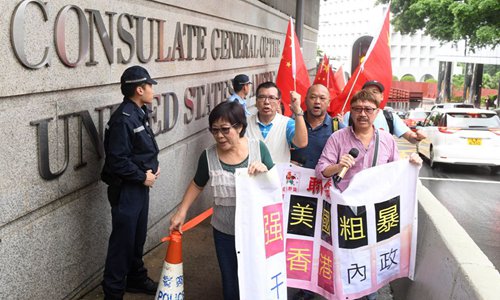HOME >> OPINION
US passage of bills on Hong Kong shows Washington unwilling to listen to reason
By Ling Shengli Source:Global Times Published: 2019/10/21 20:03:41

Demonstrators march outside the US Consulate General in HKSAR to protest against US interference in China's domestic affairs on August 26. Photo: Xinhua
The passage of three bills on Hong Kong by the US House of Representatives has upped the stakes in the ongoing eyeball-to-eyeball confrontation between Beijing and Washington. As the move breached China's redline, the US needs to hold back before it is late lest the standoff should worsen into a clash between the titans, endangering strategic relations.
Since last summer, the US has been continuously interfering in the turmoil in Hong Kong. High-level US government officials, including Vice President Mike Pence and House Speaker Nancy Pelosi, have met with protest leaders, boosting their morale. Officials from the US Consulate in Hong Kong have met with local youth protesters several times, violating diplomatic norms meant for consular personnel. It has been reported that the CIA and other members of US intelligence agencies helped organize protests in the city. The National Endowment for Democracy, a US non-profit based in Washington, has been funding protests in Hong Kong for years. All this proves how the US has been interfering in Hong Kong.
The bills passed by the US House of Representatives are the Hong Kong Human Rights and Democracy Act of 2019, the Protect Hong Kong Act and the Stand with Hong Kong Resolution. According to the first act, the US will annually evaluate whether Hong Kong remains autonomous enough for the special treatment meted out by the US to help it grow into a global financial hub.
The Protect Hong Kong Act requires stopping export of "crowd-control devices such as tear gas and rubber bullets" to the Chinese city, reported Bloomberg, adding "the bill is intended to prevent police in Hong Kong from using those non-lethal weapons on protesters." And the Stand with Hong Kong Resolution publicly supports Hongkongers' right to protest. These moves show that the US is trying to step up interference in Hong Kong. This will bring a great challenge to China-US ties.
The Chinese government opposes US intervention in China's domestic affairs in the garb of human rights and democracy. Beijing has expounded it in categorical statements.
First, the goings-on inside Hong Kong belong to the realm of China's internal affairs, and foreign forces must not meddle. Geng Shuang, China's foreign ministry spokesperson, said on October 16, "Hong Kong is part of China and Hong Kong affairs are purely China's internal affairs that brook no foreign interference. We urge the US side to come to a clear assessment of the situation, immediately stop pushing the Hong Kong-related act and stop meddling in Hong Kong affairs and China's internal affairs before falling off the edge of the cliff."
Second, it is hypocritical of the White House to interfere in Hong Kong under the name of human rights and democracy. The Chinese government has been emphasizing that Hongkongers enjoy a wide range of freedom and democratic rights. As Geng noted, "the current situation in Hong Kong has nothing to do with human rights or democracy. The real issue is to promptly end violence, restore order and safeguard the rule of law. The US House of Representatives is disregarding and distorting the facts by referring to serious criminal offenses such as arson, smashing of shops and violence against police officers as an issue of human rights and democracy."
Third, China warns the US not to cross the line related to China's core interests and the "one country, two systems" principle. Otherwise, it will not only harm China's interests, but also jeopardize China-US ties and damage US interests, because Beijing will be bound to retaliate to safeguard its sovereignty, security and development interests.
Amid the surging competition between China and the US, rifts could develop into cracks, leading to major controversies. A temporary partial trade deal between the two sides has been reached and it did not come easily. At this time, US challenging China over the Hong Kong problem, which touches upon China's core interests, will not be tolerated. China has become more determined over safeguarding its core interests in recent years and the US should be well aware of that. Strategic stability between China and the US must be built on mutual respect for each other's core interests and major concerns. Otherwise, bilateral relations are bound to be rocky. At the moment, China-US ties are going through a period of turbulence. Forced US intervention in Hong Kong is likely to lead to a huge blow to relations.
The author is secretary-general of the International Security Study Center at China Foreign Affairs University. opinion@globaltimes.com.cn
Posted in: VIEWPOINT